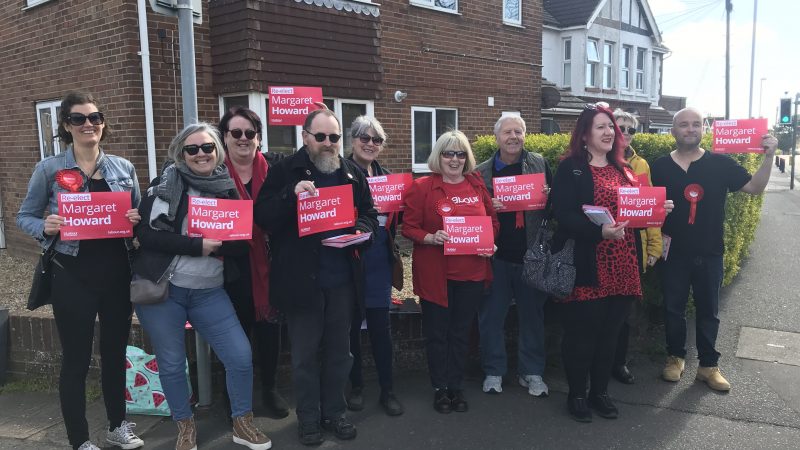
I am sitting with Margaret Howard in a hall in Worthing after a busy day of canvassing. Howard is standing for re-election in Broadwater – a ward in East Worthing and Shoreham constituency – in the upcoming local elections. Despite the fact that we are sitting in a building owned by the local party, Labour has been “irrelevant” in the town until very recently, according to fellow councillor Mike Barrett who recollects how the party was beaten in one ward by the BNP back in 2010. But now, ahead of the ballot on May 5th, the mood is hopeful.
I start my day in Worthing canvassing with Howard in her ward. I’m warned that the road we’re on is not only very long, but historically has not been a good area for Labour. “I remember four years ago it being a disaster,” Howard tells me, describing herself and other activists on that day as “so fed up by the end of it”. But this assessment is a world away from what we see. The people at the first door we knock on quickly inform us that they are Labour voters, take a poster and put it up in their front window before we’ve even moved on to the next house. This encounter sets the tone for the rest of the session.
Labour’s sudden surge on Worthing council – from zero seats in 2016 to level pegging with the Tories on 17 in 2022 – is attributed to various factors by the councillors, candidates and party activists I speak to. According to campaign coordinator for East Worthing and Shoreham Labour Hilary Schan, the “major factor” was the increase in membership under Jeremy Corbyn. “The Labour vote has always been here,” she explains. “But there was just no one there to get it out.”
Labour’s group leader on the council Beccy Cooper became Worthing’s first Labour councillor in more than 40 years when she won a by-election in Marine ward in Worthing West in August 2017. She emphasises the role of the local Conservative administration’s failings in boosting her party’s fortunes. “They were incredibly complacent,” she tells me in her kitchen over some post-doorknocking tea and biscuits. Others I speak to share this viewpoint. “They just don’t listen to people,” Schan says. “They put things out for consultation, and then they ignore it. And they do what they want anyway.” Helen Silman, elected as a councillor in Heene ward in 2019, argues that the Tories “appear not to have much interest in the town other than doing big, shiny development things”.
‘Community’ is a word I hear over and over during my visit. “We’ve very much based ourselves in the communities and very much based ourselves on listening to the communities and really trying to reflect what it is the communities need,” Cooper tells me. Howard also stresses the impact of Labour’s community work in building the party’s profile, detailing the initiatives she and others have introduced in recent years – including setting up the Worthing Food Foundation, which now delivers to 100 families a week. Local activist – and mother to Schan – Pat Schan explains that the local party’s manifesto is focused on “really simple stuff”: “No political speak, no huge promises. Just what the community want.”
Jim Deen, who is standing for re-election in Central ward, also points to a wider demographic shift along the south coast. “Hove was, in the 1980s, pretty well where we were in the 2000s, in that it was solidly Tory,” he tells me when we stop for tea in a Morrisons supermarket cafe in his ward. “Look at it now, it’s one of our safe seats.”
Fellow council candidate Rita Garner lived in Hove before moving to Worthing. She agrees with Deen that Worthing is following a similar to pattern, although she puts it “seven or eight years behind” rather than two decades. Garner argues that proposed parliamentary constituency boundary changes could accelerate Labour’s progress in Worthing even further: “If they change the boundary, and we get a Worthing-centred constituency here, then we’ll have hundreds of people getting the vote out to get a Labour MP in Worthing, and I can see that as a real possibility.”
The local candidates feel that they have a genuine chance to push Labour’s gains further here. The party taking five additional seats in May is “doable”, Cooper tells me, which would take them to 22 and a Labour-controlled council. Deen notes that there are “very few straight seaside towns” that are Labour-controlled: “The seaside towns seem to doggedly stick to being Tory.” Reflecting on Worthing Labour’s success so far in bucking this trend, he adds: “We’re just hoping it will spread.”




More from LabourList
‘Mor-gone but not forgotten’
Downing Street director of communications Tim Allan resigns
‘Treasury ‘Green Book’ reform is a game-changer for left-behind coastal towns’